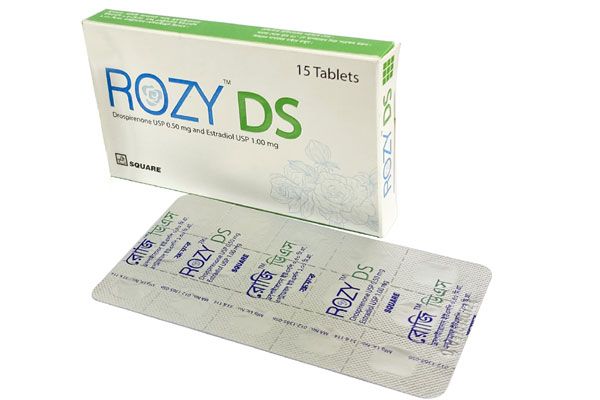
Type:15 Tablets
Generic Name:Drospirenone + Ethinylestradiol
Manufacturer:Square Pharmaceuticals PLC.
Price:৳360.00
Acne, Oral contraception, Premenstrual dysphoric disorder.
May be taken with or without food. Take dose at the same time each day. Women should be instructed to take the tablets at about the same time every day, preferably after the evening meal or at bedtime. 1 tab/day for 21 days followed by 7 pill-free days before starting on a new pack or after taking 21 light yellow tablets for 21 days, then continue taking one white placebo tablet every day from the last row in the pack for next 7 days. 1 tab/day for 24 days followed by 4 pill-free days before starting on a new pack or after taking 21 light yellow tablets for 21 days, then continue taking one white placebo tablet every day from the last row in the pack for next 4 days.
Contraception 1 active tablet (3 mg drospirenone/0.03 mg EE) PO qDay for 21 days, THEN 1 inert tablet PO qDay for 7 days 1 active tablet (3 mg drospirenone/0.02 mg EE) PO qDay for 24 days, THEN 1 inert tablet PO qDay for 4 days Premenstrual Dysphoric Disorder Symptoms of premenstrual dysphoric disorder (PMDD), but only if oral contraceptive is chosen as method of birth control 1 active tablet (3 mg drospirenone/0.02 mg EE) PO qDay for 24 days, THEN 1 inert tablet PO qDay for 4 days Hepatic impairment: Avoid use.
Contraception <14 years: Safety and efficacy not established >14 years: Same dosing as adult
Renal impairment: CrCl (ml/min) <50 Avoid use.
Pregnancy. Undiagnosed abnormal genital bleeding. Renal insufficiency, hepatic dysfunction or tumor. Adrenal insufficiency, cholestatic jaundice of pregnancy, jaundice with prior oral contraceptive use. Major surgery with prolonged immobilisation. Heavy smoking (>15 cigarettes/day) in patients >35 y. History of or current thrombophlebitis or venous thromboembolic disorders. Active or recent (within 1 yr) arterial thromboembolic disease; cerebral vascular disease, coronary artery disease, severe hypertension, valvular heart disease with thrombogenic complications. Diabetes with vascular involvement; headache with focal neurological symptoms. Known or suspected breast carcinoma, endometrial cancer, oestrogen-dependent neoplasms.
Ethinylestradiol is a synthetic oestrogen while drospirenone is a progestogen with antimineralocorticoid and antiandrogenic activity. Combined oral contraceptives act by suppressing the gonadotropins. Oral contraceptives also produce changes in the cervical mucus, making it less favorable for sperm penetration even if ovulation occurs.
May increase risk of breast cancer, thromboembolism and glucose intolerance. May lead to hyperkalaemia in patients with adrenal insufficiency. May affect serum triglycerides and lipoprotein levels. May cause retinal vascular thrombosis; discontinue treatment if papilloedema or retinal vascular lesions occur. Caution when used in patients with depression, history of migraines or risk factors for coronary arterial diseases. Patients with diseases which may be worsened by fluid retention. May have dose-related risk of gall bladder disease. Increased risk of CV side effects when used in smokers, especially if they are >35 yr of age. Recommended to stop treatment 4 wk before and for 2 wk after elective surgery associated with high risk of thromboembolism or periods of immobilisation. Lactation. Lactation: Small amounts of steroids are excreted in breast milk; estrogens may reduce quality/quantity of milk; may be prudent to use other forms of birth control until full weaning (AAP Committee states compatible with nursing)
>10% Premenstrual syndrome (13.2%),Migraine/headache (10.7%) 1-10% Breast pain/discomfort/tenderness (8.3%),Menstrual irregularities (4.7%),Nausea/vomiting (4.5%),Abdominal pain/discomfort/tenderness (2.3%),Mood changes, including affect lability, depression, alteration of mood, mood swings, and irritability (2.3%) Frequency Not Defined Irregular uterine bleeding,Venous/arterial thromboembolic events, including DVT, PE, stroke, MI, intracardiac thrombosis, sagittal sinus thrombosis, intracranial venous sinus thrombosis, retinal vein thrombosis,Hypertension,Hypersensitivity,Hyperkalemia,Chloasma,Gallbladder disease,Toxic skin eruption,Uterine leiomyoma
Pregnancy category: X Lactation: Small amounts of steroids are excreted in breast milk; estrogens may reduce quality/quantity of milk; may be prudent to use other forms of birth control until full weaning (AAP Committee states compatible with nursing)
Increased risk of hyperkalaemia when used with ACE inhibitors, angiotensin II receptor antagonists, aldosterone antagonists, potassium salts or NSAIDs. Aminoglutethimide may increase hepatic metabolism of progestins. Increased risk of systemic acidosis when used with ammonium chloride. Serum concentrations may be reduced by aprepitant, topiramate, rifampin or protease inhibitors. Efficacy may be reduced by concurrent use of acitretin, carbamazepine, felbamate, oxcarbazepine, phenobarbital, phenytoin, topiramate, barbiturates, griseofulvin, modafinil. Oestrogens may decrease the clearance of benzodiazepines that undergo oxidative metabolism. Concurrent use may increase the serum levels of systemic corticosteroids, ciclosporin, tizanidine, voriconazole and selegiline. May affect the efficacy of coumarin derivativesl; thus combined use is not recommended. May reduce the efficacy of protease inhibitors and lamotrigine.